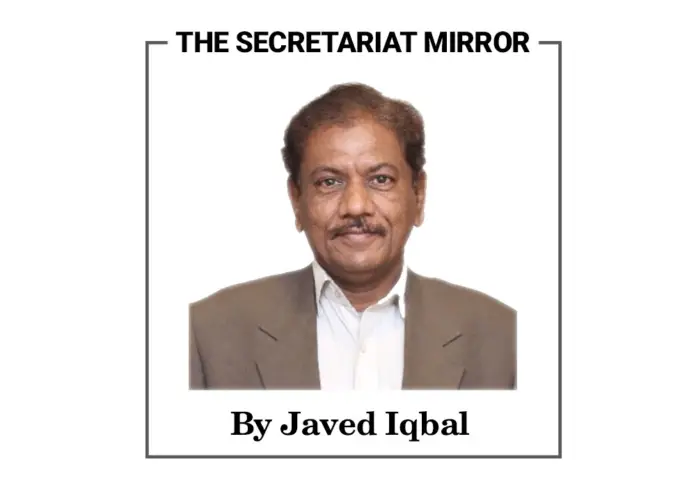As Pakistan faces the worst economic recession, massive reshuffle in bureaucracy that should only be at least an annual affair has become a permanent practice.
The caretaker setup has fully exercised this tool despite financial limitations.
Elections cost billions of rupees to the taxpayers, the pre and post-election transfers add to the economic vows of poor people.
Political postings, recruitment lacunas, superiority syndrome among civil servants, have already made bureaucracy a poor performer.
The undue transfers and postings of hundreds of civil servants just before the upcoming elections in Punjab are, as many allege, an example of political interference in the workings of the administrative system.
As the curtains falls on the elected government giving edge to caretakers, the transfer of civil officers, every time, assumes significance.
The Chief Secretary, SMBR, Chairman Planning &Development, ACS, Home secretary, IGP, many administrative secretaries, Commissioners, DCs, ACs besides police brass have been transferred. Many postings are transparently made while there is criticism on many postings like DG Anti-corruption.
The ruling setup is trying to ensure that its grip over administration does not loosen.
It is outrageous that officers are being transferred and posted purely for political reasons, instead of on the basis of their qualifications or experience. This shows that those in charge are more interested in holding to power. The people of Punjab deserve better than this, and they will certainly express their anger at the polls, said Numan Ali, a political activist.
“This is nothing but a clear case of cronyism,” said one official who was recently transferred. “Many of us are qualified for these positions, but we’ve been passed over in favour of those who are well connected.”
“It’s ridiculous,” said one analyst Shah Nawaz. “The government is saying that it needs to save money, but it’s spending millions of rupees on unnecessary transfers” he alleged.
According to sources in S&GAD, upon transfer, officers claim transfer grant that includes one basic pay of the scale, luggage charges@4500 kg and fare charges. The officers usually claim full rates on the plea that they travelled with family despite fact that in majority cases, they travelled single as families are settled at Lahore or abode somewhere else. Civil servants of grade 17 usually on average claim Rs80,000 as transfer grant besides luggage charges for 4500kg. A grade 18 officer gets Rs100,000, grade 19 officer Rs133,000, grade 20 Rs150,000 and grade 21 as Rs165,000 against each transfer with family. The officers also claim taxi fare for all family members from place of transfer to posting while official vehicles usually carry the ACs, DCs, Commissioners and police officers. Thus senior officers get Rs250,000 as transfer grant. It reaches Rs500,000 against each post as stunningly, the exchequer pays to two officers against each transfer.
This move has come under sharp criticism from various quarters, with many people asserting that this is nothing but a blatant misuse of taxpayers’ money. Dr M Sabir, a critic, has gone so far as to call it “legalised corruption”. He has said that “such a large amount could be put too much better use if it is invested in social welfare schemes or infrastructure projects”. Such grants should only be allowed once after tenure is complete.
In fact, they are causing more harm than good by disrupting service delivery and demoralising civil servants. The government should reconsider these transfers in light of the current economic recession, Nawaz suggested.
Minute Mirror investigation, back channel interviews of serving and retired officers revealed facts and drawbacks on the issue.
There is only moving not removing culture in the stronghold of bureaucracy. This is sad state of affairs.
The massive reshuffle in the administrative bureaucracy should involve the following steps. The government may appoint a committee of experts to develop a road map for the transfers.
The road map should be based on the principle of meritocracy and will aim to create a more efficient and effective administrative machinery.
The government should then initiate a process of rationalization and reorganization of the administrative setup based on the road map to make it more efficient and effective. The public sector is not immune to rationalization – the process of making decisions should be driven by logic, economics and purpose rather than political favour
Transfers if necessary will be based on job performance, seniority, and other factors as determined by the committee.
Officers should be given reasonable notice of a transfer and an opportunity to say their case for why they should be transferred.
Firstly, an independent commission may be formed to study officers and recommend changes. The same task may be assigned to public service commission.
There can be a comprehensive policy on transfers of officers between departments. The receiving department is to review the officer’s file and determine if the officer is qualified for the position. The officer must meet all qualifications for the position. If the officer is qualified, the transferring department is to forward all relevant information to the receiving department, including monetary load, certification, training information, key performance initiatives, disciplinary history, performance evaluations etc. These should also be made public on S&GAD’s website for transparency under Right to Information Act 2013.
Finally, the government should respect apex court ruling in Anita Turab case that stressed to ensure tenure and follow rules while making transfers, postings of officers. The officers should not obey illegal orders. Moreover, officers can’t be posted as OSDs.
It is high time to either rationalize the administration and link monetary benefits of officers to performance or face further financial crunch and administrative anarchy.






